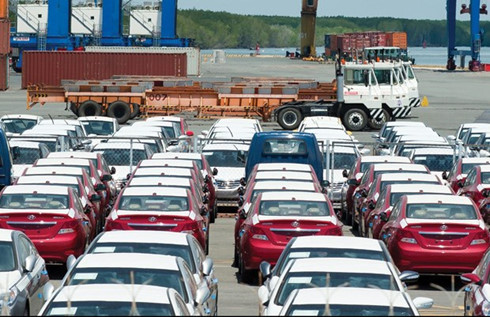Vietnam tightens car import controls
 |
The ministry has urged the General Department of Customs, the General Department of Taxation and the provincial tax departments to take measures to verify the origin and the customs value of imported automobiles.
For imported cars (excluding those eligible for incentives and diplomatic immunity), certificates of origin (C/O) and customs dossiers must be submitted at the time of performing customs clearance procedures.
Customs offices are obliged to do careful examinations and refer to the rules on the legitimacy, stamp and signature of the C/O. In suspicious cases, they must ask for verification or discuss with the countries where the C/O is issued to identify the origin of the vehicles.
In addition to the C/O, the customs has to look into the VIN code and the websites of carmakers to gather information for management. If the VIN code displays signs of eradication and abrasion, they must request verification.
For those cars that had gone through customs before November 28, 2016, a post-clearance check might be conducted if their C/O had not been provided at the time of import.
To strengthen controls on the taxable value of imported cars, the Ministry of Finance has asked customs agencies to closely examine the value declared and have price consultation right when customs procedures are performed.
Customs offices are responsible for building a national database and supplying the value declared to local tax authorities.
In return, tax agencies are in charge of providing customs units with the selling price quoted by importers, the price for calculation of excise tax and registration fee of imported cars, for reference and tax administration.
For those cars whose customs procedures have not been completed, they may not be brought to warehouses of importers.
In addition, inspection and supervision should be tightened for the records of temporarily import for re-export, as well as the time and the location for storage of the vehicles brought into Vietnam in this method.
The General Department of Customs is tasked with providing monthly updates and completing the price database and the list of items with pricing risks as a basis for consultation.
What the stars mean:
★ Poor ★ ★ Promising ★★★ Good ★★★★ Very good ★★★★★ Exceptional
Latest News
More News
- NAB Innovation Centre underscores Vietnam’s appeal for tech investment (January 30, 2026 | 11:16)
- Vietnam moves towards market-based fuel management with E10 rollout (January 30, 2026 | 11:10)
- Vietnam startup funding enters a period of capital reset (January 30, 2026 | 11:06)
- Vietnam strengthens public debt management with World Bank and IMF (January 30, 2026 | 11:00)
- PM inspects APEC 2027 project progress in An Giang province (January 29, 2026 | 09:00)
- Vietnam among the world’s top 15 trading nations (January 28, 2026 | 17:12)
- Vietnam accelerates preparations for arbitration centre linked to new financial hub (January 28, 2026 | 17:09)
- Vietnam's IPO market on recovery trajectory (January 28, 2026 | 17:04)
- Digital economy takes centre stage in Vietnam’s new growth model (January 28, 2026 | 11:43)
- EU Council president to visit Vietnam amid partnership upgrade (January 28, 2026 | 11:00)
















 Mobile Version
Mobile Version